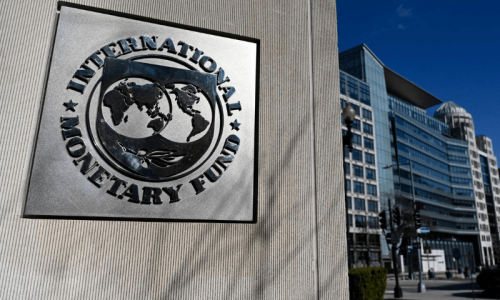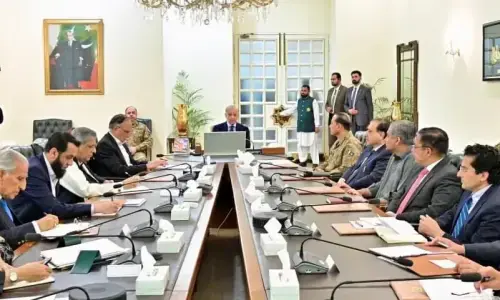THE technical IMF mission, which is taking stock of Pakistan’s economic governance structure and its vulnerability to corruption, is expected to widen the focus of the reform effort to a broader range of institutional restructuring for inclusive and sustained growth.
The mission will be in the capital for a week to scrutinise the “severity of corruption vulnerabilities” across six core state functions: fiscal governance, central bank governance and operations, financial sector oversight, market regulation, rule of law, and the AML/CFT regime.
It is expected to engage with numerous stakeholders, including the judicial, State Bank and SECP authorities, election bodies, finance and revenue officials, and others to review their processes.
The review of the judicial and regulatory systems is part of the present loan programme — Pakistan has committed to the Fund that it will strengthen its institutional capacities to fight corruption, support inclusive growth, and provide a level playing field for businesses and investment.
Following the examination, the lender will share its ‘Governance and Corruption Diagnostic Assessment’ findings with the government by July as part of the $7bn funding programme. The assessment will analyse governance and corruption vulnerabilities, and identify priority structural reforms. It is expected to help the government take action to address corruption and strengthen integrity and governance to promote transparency.
Pakistan’s unfinished reform agenda has mostly focused on tax, trade, exchange, monetary policy, and other areas. While these areas are crucial and in dire need of structural changes, our problems go much deeper.
The larger picture requires our policymakers to not just prioritise economic fundamentals but also our justice system, law enforcement, education, healthcare, and the bureaucracy, among others. Strengthening these foundations of the economic superstructure will help make the economy competitive and boost growth.
Without these, nothing will work to strengthen productivity, tax revenues, and trade, or to attract investment, especially foreign private investment, the biggest source of non-debt-creating inflows.
For example, a handicapped corrupt justice system unable to protect investors against the breach of contracts or the high-handedness of corrupt officials is a far bigger factor in scaring away foreign capital to other destinations than the nation’s unfair tax system and other market imbalances.
Similarly, no one would want to invest in a country where only illiterate or semi-literate labour with poor skills and low productivity — a direct result of poverty, lack of education and health challenges — is available. The Fund’s diagnoses of issues in our judicial and regulatory system should hopefully prepare the ground for the much broader institutional reforms beyond the ones to which the IMF loan is tied.
Published in Dawn, February 11th, 2025































